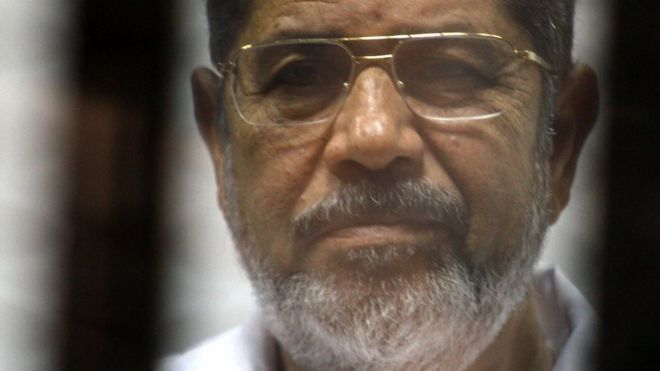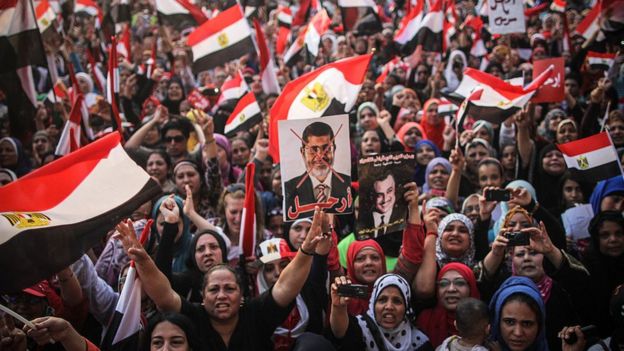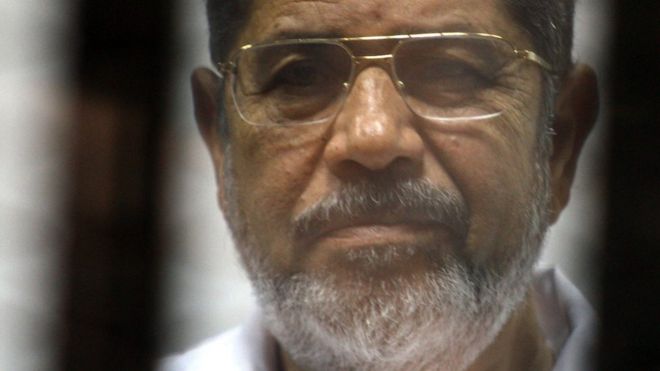 Image copyrightAFP
Image copyrightAFPEgypt’s former President Mohammed Morsi, who was ousted by the military in 2013, has died after fainting in a courtroom, officials say.
A top figure in the now-banned Islamist movement Muslim Brotherhood, Morsi collapsed in a cage after speaking at a hearing on charges of espionage.
Morsi, who was 67, had been in custody since being ousted following mass protests a year after he took office.
Officials then launched a crackdown on his and Muslim Brotherhood supporters.
Morsi’s hearing in the capital, Cairo, was related to charges of espionage emanating from suspected contacts with the Palestinian Islamist group Hamas.
He collapsed moments after addressing the court from a cage some defendants are kept in during sessions, Egypt’s public prosecutor said, adding that a medical report showed no apparent recent injuries on Morsi’s body.
For a long time, there have been concerns over the former leader’s prison conditions. Last October his youngest son, Abdullah, told AP news agency that his father was being held under constant solitary confinement and denied treatment for serious conditions such as high blood pressure and diabetes.
Five months earlier, Abdullah said in a Washington Post op-ed that the Egyptian authorities were “doing this on purpose, since they want to see him dead ‘from natural causes’ as soon as possible”.

A death certain to inflame passions

The death of a leader, remembered by many as Egypt’s first democratically elected president, is certain to inflame passions among his supporters and allies in Egypt and beyond. Turkey’s President Recep Tayyip Erdogan has been quick to describe him as a martyr. Others are certain to do the same.
There has long been concern about the politicised trials which have kept him in prison, as well as his conditions of confinement. Morsi had a history of ill-health.
But last year, a British parliamentary panel reported he was being kept in solitary confinement for 23 hours a day, which they concluded could be classified as torture. They warned this could lead to premature death.
His sudden collapse comes at a time when the United States, reportedly at the request of Egyptian President Abdel Fattah al-Sisi, is working to designate the Muslim Brotherhood as a foreign terrorist organisation. The death of one its most senior figures will deepen the anger and anxiety in this global Islamist movement.

Who was Morsi?
Morsi was born in the village of El-Adwah in the Nile Delta province of Sharqiya in 1951. He studied Engineering at Cairo University in the 1970s before moving to the US to complete a PhD.
 Image copyrightGETTY IMAGES
Image copyrightGETTY IMAGESHe was chosen as the Muslim Brotherhood’s presidential candidate for the 2012 election after the movement’s preferred choice was forced to pull out.
Critics complained that, as Egypt’s president, he had failed to deliver during his turbulent year in office, accusing him of allowing Islamists to monopolise the political scene and mishandling the economy.
Public opposition to his government grew and millions of anti-government protesters took to the streets across Egypt to mark the first anniversary of the day he took office, on 30 June 2013.
On the evening of 3 July, the army suspended the constitution and announced the formation of a technocratic interim government ahead of new presidential elections. Morsi, who denounced the announcement as a coup, was taken into custody by the army.







